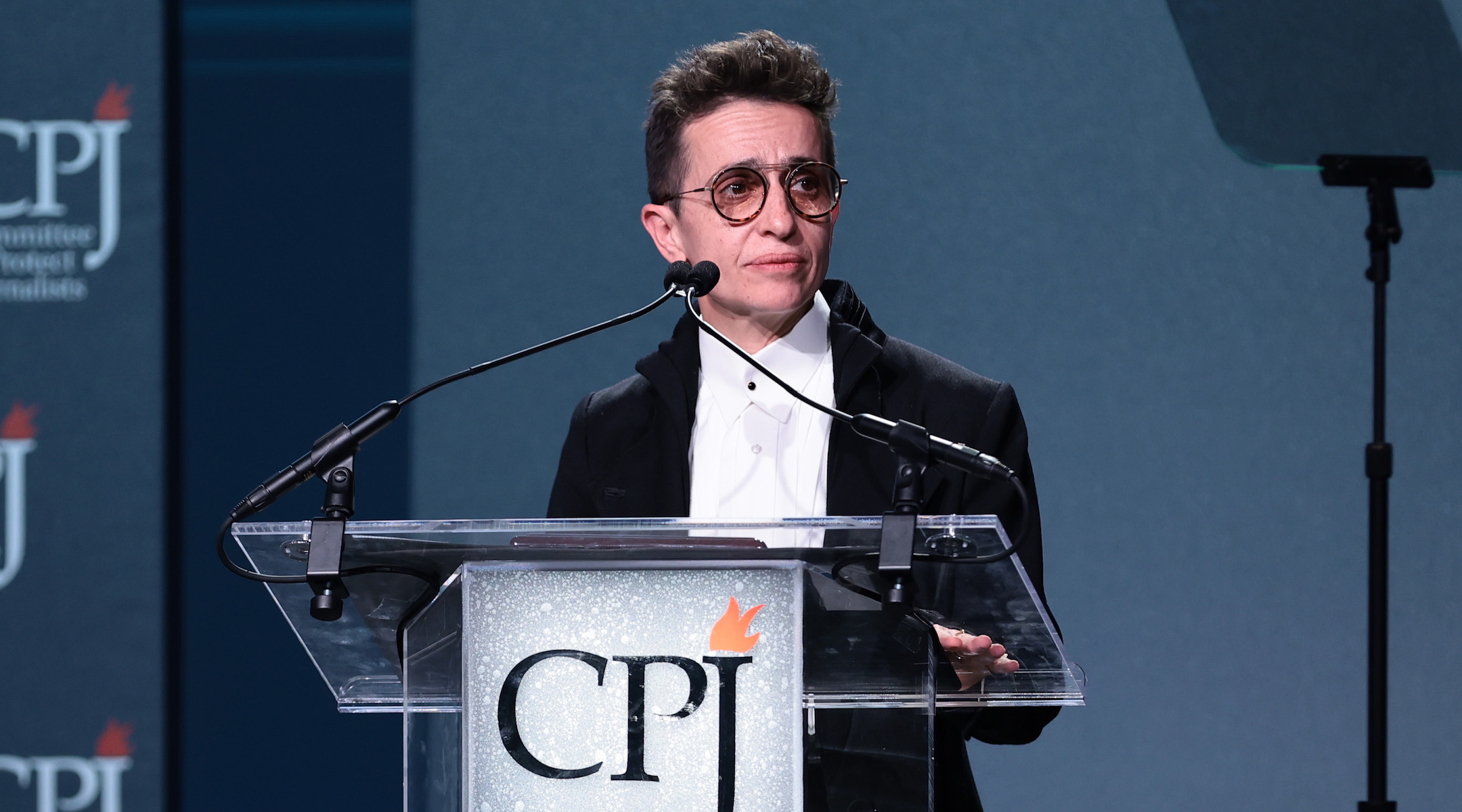Russia sentences Jewish writer Masha Gessen to prison in absentia for comments on Ukraine war
Gessen joins a growing list of Jewish writers targeted by Russia over the war

Masha Gessen speaks onstage at the 2022 CPJ International Press Freedom Awards at Glasshouses on November 17, 2022 in New York City. (Dimitrios Kambouris/Getty Images)
(JTA) — A Russian court has sentenced the decorated Russian-Jewish writer Masha Gessen to eight years in prison in absentia over comments they made about the country’s conduct in the Ukraine war in 2022.
The sentence makes Gessen, who uses they/them pronouns, at least the fifth prominent Jewish writer to be targeted by Russia for dissenting comments since the outbreak of war.
Gessen, a New York Times columnist and former New Yorker writer who fled the Soviet Union as a teenager and has written and commented extensively on their Judaism, has separately faced blowback from Jewish groups for their writing on Israel.
Gessen was not present for their sentencing Monday; the writer was based in Russia from 1991 to 2013, but has lived in the United States ever since. In a statement to the Times they said the sentencing was intended “to intimidate me and to prevent me from practicing my profession.”
The sentence was tied to an interview Gessen gave in 2022 with a Russian-language news outlet about Russian conduct in the Ukrainian city of Bucha, where, observers found, Russian soldiers massacred civilians. Russia accused Gessen, the author of “The Man Without a Face,” an unflattering portrait of Russian President Vladimir Putin, of spreading “false information” about the military, a common charge the country levels against its critics.
Gessen is one of the rare writers who has been castigated in both authoritarian Russia and democratic Europe, in the latter’s case owing to their highly critical writing on Israel’s war in Gaza. Last year Jewish groups objected to a New Yorker piece that compared Gaza to Nazi-era Jewish ghettos, leading a local German government to pull out of a prize named after German Jewish writer Hannah Arendt that was scheduled to go to Gessen. Gessen eventually received the prize after the shakeup.
Gessen has also authored books on Jewish themes including “Where The Jews Aren’t,” a history of the onetime Russian Jewish enclave Birobidzhan; the personal Russian Jewish family history “Esther and Ruzya,” and “Perfect Rigor,” a biography of Russian Jewish mathematician Grigori Perelman.
Russia has also jailed Evan Gershkovich, a Jewish American reporter for the Wall Street Journal, on charges of espionage, setting off international outrage over Putin’s treatment of the press. His closed-door trial began last month; the latest hearing is scheduled to take place this week.
Other Jewish writers targeted by Russia since the Ukraine war include the Georgian-Jewish mystery author Boris Akunin, a frequent Kremlin critic living in exile in London. He was blacklisted and labeled a “foreign agent” in the country earlier this year after he spoke out against the war in Ukraine and Putin. And Russian-Jewish dissident journalist Vladimir Kara-Murza has been held in a Siberian prison for over a year since being sentenced to 25 years for treason. His wife, who is living in the United States, told Western outlets this week she fears for his health if he remains in prison.
In addition, the Russian Jewish science fiction author Dmitry Glukhovsky was, like Gessen, sentenced to eight years in prison in absentia last year for accusing the Russian military of committing crimes in Ukraine. Glukhovsky has lived in Israel, speaks Hebrew and holds a degree from Hebrew University in Jerusalem; shortly after his sentencing, his Holocaust play “The White Factory,” about the Łodź Jewish ghetto’s decision to manufacture goods for the Nazis as a way of staving off their genocide, premiered in London.
A message from our Publisher & CEO Rachel Fishman Feddersen

I hope you appreciated this article. Before you go, I’d like to ask you to please support the Forward’s award-winning, nonprofit journalism so that we can be prepared for whatever news 2025 brings.
At a time when other newsrooms are closing or cutting back, the Forward has removed its paywall and invested additional resources to report on the ground from Israel and around the U.S. on the impact of the war, rising antisemitism and polarized discourse.
Readers like you make it all possible. Support our work by becoming a Forward Member and connect with our journalism and your community.
— Rachel Fishman Feddersen, Publisher and CEO























